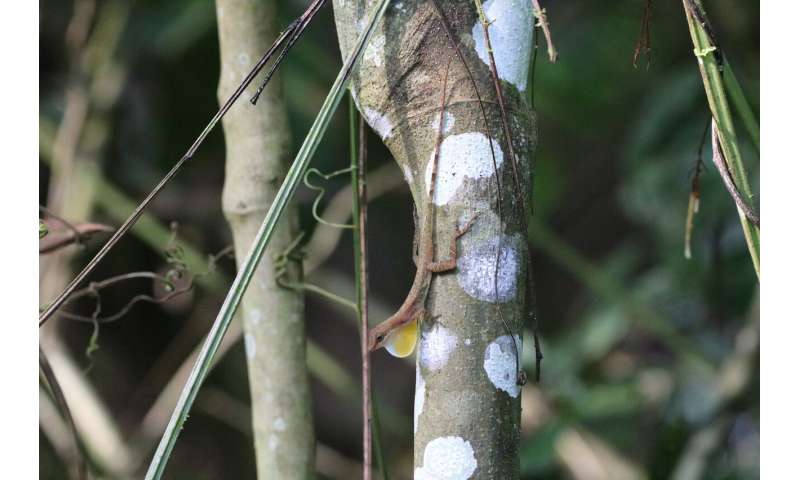#New research shows parasites ‘mite’ help curb the spread of invasive lizards
“#New research shows parasites ‘mite’ help curb the spread of invasive lizards”

Native lizards may have a powerful, very tiny, secret weapon when it comes to resisting invasion by invasive species—parasites.
While the parasites can impact the health of the native populations, they also help keep invasive populations in check. Christian Cox, an evolutionary physiologist at Florida International University (FIU) and researcher in the Institute of Environment, led a study to examine what happened when tropical lizards were introduced to new areas.
The research team’s study allowed invasion to play out in real-time. They found parasites can be a great equalizer between native and invasive species. Areas with native lizards serve as a kind of parasite reservoir, helping curb the spread of newly introduced species.
When invasive lizards were temporarily relocated to an area that didn’t have any native lizards, the scientists observed the parasites from the invasive lizards eventually disappeared. This gives them a potential advantage for a more successful invasion.
As study co-author Michael Logan from the University of Nevada points out, it’s often very difficult to study the earliest stages of invasion. It can take many years before scientists observe invasive species in an area.
The researchers recreated an invasion scenario on uninhabited islands in the middle of the Panama Canal. They caught about 200 Panamanian slender anoles from the mainland and examined them for a parasitic mite that clings to the anole’s body like a tiny transparent bubble. The team then took a boat ride across Lake Gatún and the Panama Canal to several small islands where they set the lizards free and tracked them. Two of the islands did not have any existing anoles. One island had native Gaige’s anoles, a competitor species for the Panamanian slender anole.
On the island with the Gaige’s anoles, the introduced anoles retained their mites for several generations. Some individual lizards even developed mite infections, and the invasive Panamanian slender anole did not experience any meaningful population growth while the native lizard populations remained stable. On the two islands with no native anoles, the mites disappeared completely, paving the way for healthier invasive populations and rapid population growth. This unfettered occupation is known as enemy release.
“Our work suggests that enemy release may be less likely with intact, healthy communities that contain species closely related to the invader,” Cox said. “In an area where human activity has caused the disappearance of these related species, enemy release might make it much easier for an introduced species to become invasive.
The researchers believe because the native lizards carried the same parasites as the slender anoles, the playing field was leveled. All of the lizards were dealing with the same problem. One species didn’t have an advantage over the other.
Cox believes this study highlights the importance of protecting biologically diverse communities with a variety of different species, because they will be better equipped to prevent an invasive species from taking over.
The study was recently published in Biology Letters.
More information:
Christian L. Cox et al. Ectoparasite extinction in simplified lizard assemblages during experimental island invasion, Biology Letters (2020). DOI: 10.1098/rsbl.2020.0474
New research shows parasites ‘mite’ help curb the spread of invasive lizards (2020, August 6)
retrieved 6 August 2020
from https://phys.org/news/2020-08-parasites-mite-curb-invasive-lizards.html
This document is subject to copyright. Apart from any fair dealing for the purpose of private study or research, no
part may be reproduced without the written permission. The content is provided for information purposes only.
If you want to read more Like this articles, you can visit our Science category.
if you want to watch Movies or Tv Shows go to Dizi.BuradaBiliyorum.Com for forums sites go to Forum.BuradaBiliyorum.Com


